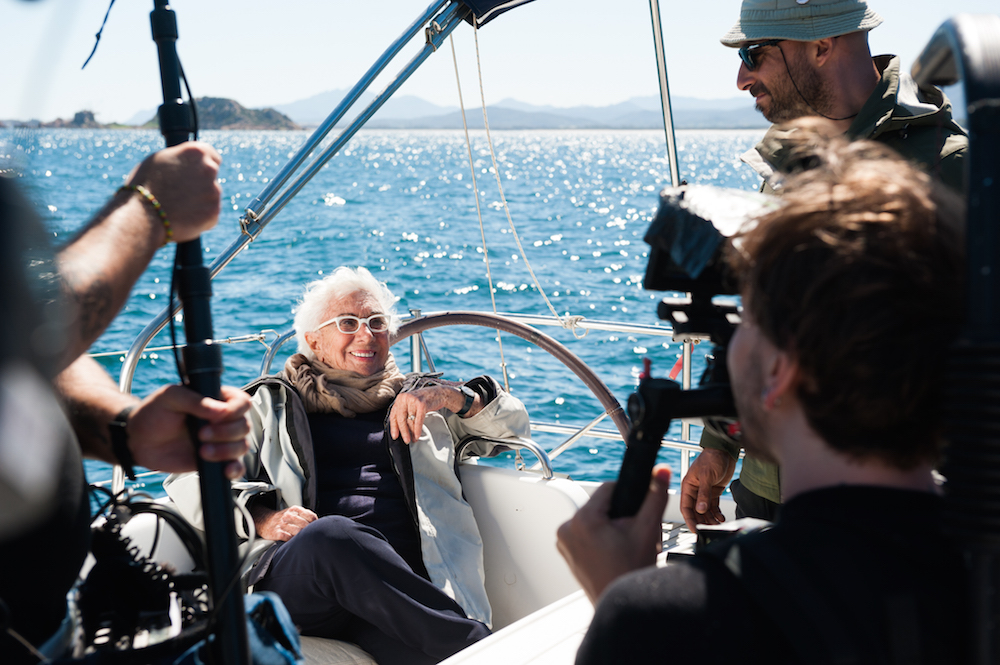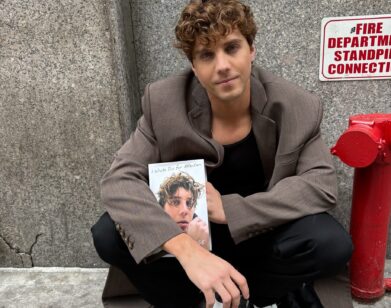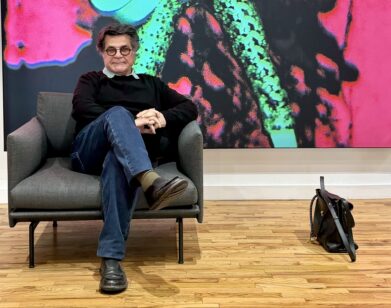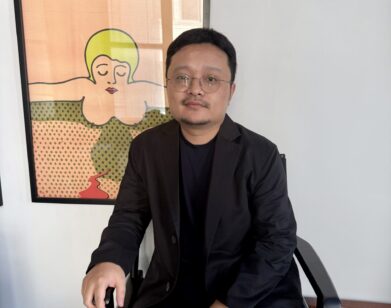Lina Wertmüller: Creative Chaos
Lina Wertmüller relishes a voracious appetite. Whether for sex, sun, or socialism: the 88-year-old Italian director, over her 50-odd years making cinema, has produced a body of work that gleefully dismantles the most grotesque and unsavory impulses of the human psyche. At first I figured her for a Gemini, but perhaps even more apt, the Rome-born polymath, who is never without her signature white-framed glasses, is a Leo.
Raised during Mussolini’s fascist dictatorship, Wertmüller studied theatre, and through her friends Flora Carabella and her husband, Marcello Mastroainni, she connected with Federico Fellini and served as his assistant director on 8 ½ [1963]. Her directorial debut, The Lizards [1963], made largely with Fellini’s crew, was a raw, neorealist take on three young drifters grappling with daily life in the impoverished Italian south. But her work in the ‘70s, a series of decadently-staged farces and sexual-political polemics like Love & Anarchy [1973]; The Seduction of Mimi [1972]; Swept Away [1974]; and the controversial World War II drama Seven Beauties [1975], which earned her the first female nomination for the Best Director Academy Award, garnered her international acclaim and inevitably, notoriety.
Though many of her critics skewered her seemingly inconsistent ideologies and dubious sexual politics, Wertmüller’s bacchanalian corpus—with its playful vulgarity, strong anti-fascism, and takedowns of machismo, Italian class warfare, and the hypocrisy of the dueling communist and socialist movements in post-war Italy—stands alone as an expression of her indelible dual-minded, comic-meets-tragic vision. Starting today, the newly opened Quad Cinema in New York will present “Lina Wertmüller: Female Trouble,” a comprehensive series of her films, as well as screenings of 8 ½ and Behind the White Glasses, a new documentary on Wertmüller directed by Valerio Ruiz. Interview recently corresponded via email with Wertmüller from her apartment in Rome, about breaking the rules and capturing an audience’s “curiosity and malice.”
COLLEEN KELSEY: Are you still engaged with politics these days?
LINA WERTMÜLLER: I continue to follow politics through media and newspapers but I’m not as engaged. Even if my films are deeply connected with politics, I’ve never endorsed a particular movement or party. My engagement has always been from an external point of view.
KELSEY: In Valerio Ruiz’s documentary about your life, you mention that there was a possibility of you becoming an actress, but being a director was much more natural. When did you realize filmmaking was what you were suited for?
WERTMÜLLER: I started my career studying at Pietro Sharoff Theatre Academy. I had immediately preferred to be a director. I worked as assistant director for many years before my debut film and I have had the great gift to work close to Federico Fellini. I don’t remember a precise moment. Probably I had always knew that my aim was to become a movie director.
KELSEY: How did your early work in the theater affect your approach to making cinema?
WERTMÜLLER: My theater roots gave me a very good preparation for working with actors. I always prepared for my films by insisting on many days of rehearsals with the cast. Since my first films, I’ve always asked to my actors to spend 40 days reading the screenplay and playing each scene. I also love improvisation in acting and that is probably something that derives from my theater background.
KELSEY: When did you first meet Fellini? What was your relationship with him like, and what was your experience working as his assistant director on 8 ½?
WERTMÜLLER: I met him thanks to my friend Flora Carabella and Marcello Mastroianni. The experience was enlightening. Federico was a magician to me, a real poet of the images. You can’t learn from an ingenious talent like him, but you can certainly admire his way of working.
KELSEY: Much of the 8 ½ crew worked on your first film, The Lizards, in which you went south. Many of your other films feature southern characters or take place there. What is your connection to it?
WERTMÜLLER: The Lizards is set between Puglia and Basilicata. My grandfather’s family comes from Italian south, from Palazzo San Gervasio in particular, the little town where I’ve shot part of my first film. I’ve always loved the sunny regions of Italy. I have a sort of natural feeling with the location, with the sea and the sun.
KELSEY: Again, as you say in Ruiz’s documentary, you have “two souls”—the lighthearted and the serious—at the core of “your nature.” You also say that you would want to be remembered as not just socially conscious, but a “director who had fun.” How has that manifested in your films—their themes, their subjects, etc.? What do you think about rules?
WERTMÜLLER: My two souls, the socially conscious one and the lighthearted one, are always in my movies because they find a perfect habitat in my grotesque style, which combines tragedy and humor, irony and sarcasm, comedy and drama. I also feel that rules are made to be broken, especially in art! I prefer creative disorder to strict rules.
KELSEY: Swept Away is, to me at least, a fascinatingly provocative example of the idea of “the personal is political.” How did you develop the idea for the film?
WERTMÜLLER: I was in Sardinia with my husband Enrico and some friends, we were spending a week on a sail boat. I had the idea during the holiday and I started to write it down immediately. I always write my films in few weeks. The idea of the deserted island had a sense of precision to me. It represents a world with no rules and no laws—the only background where Gennarino and Raffaella’s love could exist.
KELSEY: Why do you think sexuality and politics, when brought together, yield such an explosive result? You’ve also had a lot of fun with satirizing Italy’s culture of machismo.
WERTMÜLLER: Yes, I used a lot of irony to depict fascism in my Love & Anarchy. Irony is my faithful companion. It helps me to underline vices and defects of the human being. As per your question, I think the two topics always capture audience’s curiosity and malice.
KELSEY: What was it about your frequent collaborators, Giancarlo Giannini and Mariangela Melato, that made them so suited to the characters you created for them?
WERTMÜLLER: It’s very simple, they were very good actors! When you make many films with the same actors you can develop a special understanding with them. I love working with people I know and that I trust. As I said, we also spent so much time preparing, rehearsing for many days before the shoot.
KELSEY: Your late husband Enrico created incredible sets and costumes for you. What was your collaborative process like?
WERTMÜLLER: I’ve been very lucky in my life. I’ve spent more then 40 years with Enrico. He was a rare powerful artist, very discreet and sometimes shy. He started as painter and visual artist before lending his arts to theatre and cinema. He was my first reader and critic. In our works everything started from sketches. He could make beautiful sketches in a few minutes. He loved to spend his time painting and drawing. His drawings represented our starting point because they were so clear and rich that they could immediately communicate the atmosphere of the story. Enrico’s taste is in all of my films. I could not be more fortunate.
KELSEY: Do you have any regrets?
WERTMÜLLER: I’ve no regrets. I’ve been so fortunate, and I feel very glad to be alive.
“LINA WERTMÜLLER: FEMALE TROUBLE” BEGINS TODAY AT QUAD CINEMA IN NEW YORK. TO LEARN MORE, VISIT THEIR WEBSITE.







